| |
UFO Books: Life in the Universe |
|
| *Click
on a book title or image to view the full report |
|
|
| Books 1 - 17 out
of 17 in this section |
|
click on "Next Page" to see more books in this section |
|
|
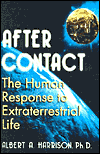
After Contact: The Human Response to Extraterrestrial Life
Albert A. Harrison
Albert Harrison examines in detail the psychological, sociological, political, and cultural dimensions of the search for extraterrestrial intelligence. By so doing, he firmly establishes that the behavioral and social sciences are as integral to the search as are the physical and biological sciences that have dominated the field up to now. This book offers a useful conceptual framework for rational discussion of extraterrestrial life forms, and provides a detailed analysis of likely human reactions to the detection of extraterrestrial life.
|
|
|
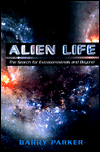
Alien Life: The Search for Extraterrestrials and Beyond
Barry Parker
Parker (physics and astronomy, Idaho State U.) surveys all the popular topics in the aliens craze, giving an overview of the subject and discussing the work of numerous scientists, science fiction writers, psychologists, and theorists. He discusses the development of life on our planet, the possibility of microbial life on Mars, life on other planets and moons in the solar system, life on planets outside of our solar system and what form their civilizations might take, SETI, UFOs, and our future exploration of the universe.
|
|
|
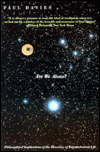
Are We Alone? Philosophical Implications of the Discovery of Extraterrestrial Life
Paul C. W. Davies
What must we assume about the laws of physics, the nature of the universe, and the nature of life and intelligence in order to expect that there is intelligent life out there? And if there is, what would it do to our science, our religions, and our world view in general? Are We Alone? ponders the enormous implications for such major philosophical and religious issues as the mind-body problem, the nature of life and consciousness, and the place of mankind in the cosmos.
|
|
|
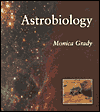
Astrobiology
Monica M. Grady
Grady (head of petrology and meteoritics at The Natural History Museum) provides a general reader's introduction to a relatively old area of inquiry—whether and where there is life elsewhere in the universe. Using dozens of large color photos and diagrams, she describes how life evolved on Earth, the likeliness of life in other parts of the solar system, the search for Earth-like planets, and SETI.
|
|
|
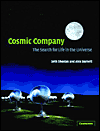
Cosmic Company: The Search for Life in the Universe
Seth Shostak, Alexandra Barnett
In Cosmic Company, Seth Shostak and Alex Barnett ponder the possibility of aliens visiting the Earth, as well as the consequences of receiving a signal from the cosmos proving we're neither alone, nor the most intelligent life forms. They explain why scientists think life might exist on other worlds, and how we might contact it. Shostak and Barnett, experienced writers of popular astronomy, provide an accessible overveiw of the science and technology behind the search for life in the universe.
|
|
|
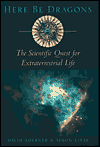
Here Be Dragons: The Scientific Quest for Extraterrestrial Life
David W. Koerner, Simon LeVay
In Here Be Dragons, astronomer David Koerner and neurobiologist Simon LeVay offer a scientifically compelling and colorful account of the search for life beyond Earth." "The authors survey the work of biologists, cosmologists, computer theorists, NASA engineers, SETI researchers, roboticists, and UFO enthusiasts and debunkers as they attempt to answer the greatest remaining question facing humankind: Are we alone? Arguing that the universe is spectacularly suited for the evolution of living creatures, Koerner and LeVay give us ringside seats at the great debates of Big Science.
|
|
|
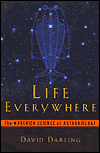
Life Everywhere: The Maverick Science of Astrobiology
David Darling
Astrobiology (also known as exobiology) has been rapidly gaining ground in recent years as new research points to the ever increasing likelihood of life in the universe. David Darling's excellent introduction to this subject covers the new discoveries, such as extremophile life forms and extrasolar planets, that make it more possible for life to exist beyond Earth and explores astonishing speculations, such as the one that life may have actually originated in outer space.
|
|
|
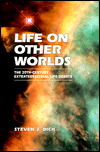
Life on Other Worlds: The 20th-Century Extraterrestrial Life Debate
Steven J. Dick
Dick, an astronomer and historian of science at the US Naval Observatory, offers an antidote to the sensationalism surrounding the search for extraterrestrial life in this overview of the history of theories of life on other planets, recent advances in planetary science, and the latest thinking on the likelihood of life in outer space. He also demystifies the agenda of sensationalists who seek to impose their own radical cosmology based on conjecture rather than scientific fact.
|
|
|
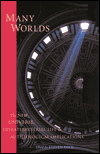
Many Worlds: The New Universe, Extraterrestrial Life, and the Theological Implications
Steven J. Dick
An eminent cast of scientists and science-and-religion writers is ultimately unable to achieve the loosely conceived goal of this conference volume: to discuss the theological implications of cosmic evolution and the possibility of extraterrestrial life and intelligence. Most essays read like opening statements rather than genuine dialogue. Readers may easily become disoriented by elliptical discussions of "the astounding facts of the new universe" while sifting through radically different portrayals of what science says about cosmic origins and biogenesis.
|
|
|
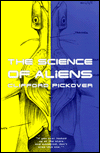
Science of Aliens
Clifford A. Pickover
What would aliens look like? An intelligent octopus-like creature is certainly plausible. What about odd numbers of limbs - a three-legged alien with three arms and three eyes? Could there be an entire planet of immobile, silicon-based "trees" that communicate with each other via electrical signals? The Science of Aliens gets weirder still. Could a giant interstellar cloud be "alive" and intelligent? Could creatures live at extremely high pressures and temperatures? Would they have any interest in abducting us? In classic Pickover style, here is scientifically based speculation at the far edge of knowledge-and beyond.
|
|
|
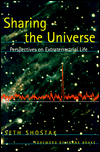
Sharing the Universe: Perspectives on Extraterrestrial Life
Seth Shostak
Shostak is the Public Programs Scientist for the SETI (Search for Extraterrestrial Intelligence) Institute. In this fascinating speculative book, he builds a careful case for the importance of the institute's work, narrowing the range of the galaxy's possibly life-nurturing stars and imagining what forms non-carbon-based life might take.
|
|
|
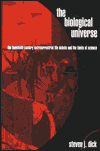
The Biological Universe : The Twentieth Century Extraterrestrial Life Debate and the Limits of Science
Steven J. Dick
The Biological Universe provides a rich and colorful history of the attempts during the twentieth century to answer questions such as whether "biological law" reigns throughout the universe and whether there are other histories, religions, and philosophies outside those on Earth. Covering a broad range of topics, including the search for life in the solar system, the origins of life, UFOs, and aliens in science fiction, Steven J. Dick shows how the concept of extraterrestrial intelligence is a world view of its own, a "biophysical cosmology" that seeks confirmation no less than physical views of the universe.
|
|
|
|
|
|

The Extraterrestrial Life Debate, 1750-1900
Michael J. Crowe
This is the first detailed, scholarly study in English of the many varied astronomical, philosophical and religious ideas that developed between 1750 and 1900 regarding the existence of intelligent extraterrestrial life. The author examines the great extent to which prominent historical figures (Kant, Herschel, Paine, Lowell, etc.) engaged the issue, and demonstrates the powerful effect the question has had on Western intellectual life.
|
|
|
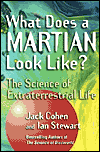
What Does a Martian Look Like?: The Science of Extraterrestrial Life
Jack Cohen, Ian Stewart
In What Does a Martian Look Like?, two respected scientists and authors combine real science with the creations of some of the world's most inventive science fiction writers to imagine how life may have evolved elsewhere in the universe. They show that the universe is not populated with countless variations on the humanoid form or horrifying creatures drawn from your worst nightmares. Instead, they demonstrate how universal principles of life might produce amazingly diverse outcomes when applied in different environments.
|
|
|
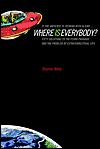
Where Is Everybody?: Fifty Solutions to the Fermi Paradox and the Problem of Extraterrestrial Life
Stephen Webb
During a lunchtime conversation at Los Alamos more than 50 years ago, four world-class scientists agreed, given the size and age of the Universe, that advanced extraterrestrial civilizations had to exist. The sheer numbers demanded it. But one of the four, the renowned physicist and back-of-the-envelope calculator Enrico Fermi, asked the telling questions: If the extraterrestrial life proposition is true, he wondered, "Where is everybody?"" "In this book, Stephen Webb presents a detailed discussion of the 50 most cogent and intriguing answers to Fermi's famous question.
|
|
|

Xtl: Extraterrestrial Life and How to Find It
Simon Goodwin, John Gribbin
Are we alone in the Universe? The best scientists are searching hard for the answer--and may be just around the corner from finding it. Two top astronomers (and bestselling authors) take a cutting-edge look at how life itself develops, survives, evolves, becomes intelligent, and where it might exist in outer space. Illustrated with breathtaking photos and state-of-the-art graphics, this thrilling story reveals a newfound understanding of the conditions that fostered life on Earth, how stars and planets are formed, the specific qualities of the Sun and planets in our solar system, and the techniques required to observe phenomena outside of our system. The fascinating advances in technology and information revealed here could enable us to locate extraterrestrials within the next twenty years!
|
|
|
| Books 1 - 17 out
of 17 in this section |
|
Click on "Next Page" to see more cases in this section
|
|
|
| |
|

